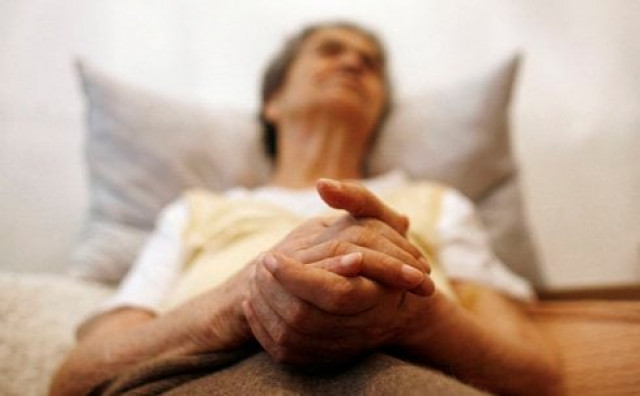Huntington’s chorea: Rare genetic disorder brings crippling implications
With little awareness and limited facilities, patients in Pakistan face a downhill battle.

With little awareness and limited facilities, patients in Pakistan face a downhill battle. PHOTO: REUTERS
Now, she knows. All too well.
“My husband, Amir, told me after one year of marriage that a genetic disorder runs in his family. I didn’t know that his mental and physical health will deteriorate so fast,” she says quietly.
Sultana, the mother of three children, is just 28 years old. She lives with her husband and in-laws, some of whom also suffer Huntington’s.
“I wish my husband and I were educated enough to seek a doctor’s opinion before tying the knot,” she says repentantly. “I will never marry off my sons. I don’t want to destroy the lives of other girls.”
No light at the end of the tunnel
“Huntington’s is incurable,” says Dr Aziz Sonawalla, a consultant neurologist at the Aga Khan Hospital. “There is no genetic testing facility in Pakistan and even its diagnosis is difficult because it’s not a common disease, like paralysis or Parkinson’s.”
Sultana is slowly coming to terms with this.

“My day passes with the kids and other household responsibilities,” she says. “But, just as night falls and the children to go bed, I sit by my husband and pray for his health, even though I know that he will never recover.”
According to Saleem Ilyas, a neurology professor at Dow University of Health and Sciences, Huntington’s is a progressive hereditary disease with three accompanying features: Movement disorder, dementia and personality disorder.
A dearth of awareness
Dr Sonawalla says that unfortunately no organisation in the country is working to create awareness about this uncommon disease.
“Only four to eight people out of 100,000 suffer from Huntington’s,” says Dr Ilyas. “The prevalence rate is low in America and even lower in Japan.”
However, there’s no way to ascertain the incidence rate in Pakistan. According to Dr Maimoona Siddiqi, consultant neurologist at the Shifa International Hospital in Islamabad, population-based studies on Huntington’s chorea have never been conducted, even in the capital city.
Hospital data indicates that only two to three such patients come to Shifa every year, seeking treatment.
“The number of patients seems high in America because genetic testing facilities are available,” she explains. “The number in Pakistan would be high, too, if this testing facility was available.”
On the outside, looking in
This lack of awareness has wide-reaching social implications. Amir has five siblings. His one sister died from the Huntiongton’s chorea a decade ago, while he himself, a brother and a sister are still suffering. Two sisters are not affected so far. One of them, Maria, is married and the other, Sheema, will be married in the next couple of months.
“People don’t have an understanding of this disease, so they ridicule us,” Maria says. “They don’t have any sympathy and look down on us. Often, they even say that the entire family is crazy.”
These pressures often force families to hide information from prospective in-laws, thus compounding the dangerous cycle.
A life of constant fear
Sheema, who is healthy so far and busy preparing for her wedding, says that she feels on edge all the time. “I live in a state of constant fear,” she says. “Whenever I come down with something minor, even the flu, I feel that it is now my turn.”
Professor Ilyas says Sheema’s fear is far from unjustified. Usually, the onset of Huntington’s begins between the ages of 35 and 40.
Similarly, Maria, who has a two-year-old son, is also scared.
“I have told my husband to get married a second time if I fall sick,” she says. “He shouldn’t waste his life with me.”
Khadima has already seen her husband and daughter die before her eyes. Now, she is witnessing the daily struggle of two sons, who are often violent.
“I have to lock them in their rooms, as they become very violent and put our lives in danger,” she says.
Dr Sonnawalla agrees that keeping such patients in locked rooms is the right decision. With the lack of facilities in Pakistan, there is simply no other option.
Published in The Express Tribune, June 17th, 2013.



















COMMENTS
Comments are moderated and generally will be posted if they are on-topic and not abusive.
For more information, please see our Comments FAQ